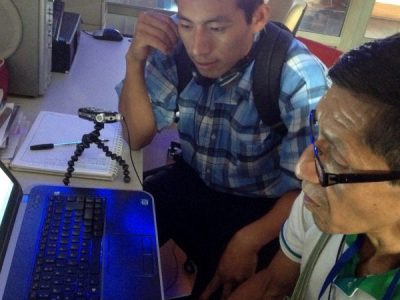The DigiGlot Newsletter is a bi-weekly collaborative newsletter that reports on how indigenous, minority, and endangered language communities are adopting and adapting technology to increase the digital presence of their languages, and in the process changing the internet landscape by increasing linguistic diversity online.
Refugees arriving in a new destination face a variety of challenges, including, very often, a language barrier. Being unable to understand and communicate in the language of the new environment can make accessing important information and services that much more difficult. The refugee crisis is global: the United Nations Refugee Agency (UNHCR) estimates that 68.5 million people worldwide have been forcibly displaced.
A new mobile app called Tarjimly (“translate for me” in Arabic), available for iOS and Android, seeks to lower this language barrier by connecting refugees and aid workers with volunteer translators offering their skills remotely via smartphone. The app connects refugees and translators via live chat, where they can choose to communicate by text, audio or video chat.
The app was launched in 2017 to offer support to people affected by the Syrian refugee crisis and the US Travel Ban. Co-founder Atif Javed said via email that there are now 8,000 registered volunteers speaking approximately 90 different languages. The most frequently used languages include Arabic, Farsi, Greek, French, Pashto, Spanish, and Italian. The Tarjimly team has been receiving requests for languages such as Tigrinya, Rohingya, Kurdish, and Somali, among others, and there is an urgent need for bilingual volunteers speaking those languages to register on the site. Additionally, there has been increasing interest in adding volunteers proficient in Latin American indigenous languages, in order to better serve people seeking asylum along the US-Mexico border.
Language immersion students can now code in Hawaiian
A group of Hawaiian programmers has translated coding language from English to Hawaiian, to help school kids in language immersion programs code in Hawaiian. The promoters of this initiative have faced unexpected challenges, such as finding terminology that is culturally relevant without sacrificing accuracy and avoiding direct translation. The programmers believe that the initiative will help people gain a deeper understanding of their work, and avoid rote learning of English terms.
Online platform boosts availability of storybooks in minority languages
Multilingual reading material for children that is engaging and entertaining is of paramount importance for language revitalization, yet there is little such material available for minority languages. StoryWeaver is an online platform created in India that allows free and open creation and sharing of storybooks in 130 different Indian and other global languages, such as Marathi, Dhopadhola, Mixe, and Shona. StoryWeaver allows storytellers to create books that are freely accessible and downloadable by others for distribution or translation into other languages. Organisations working with tribal communities in India have found the platform to be of great use, as it enables quick and easy production of storybooks in the mother tongue of children in those communities. Storyweaver currently hosts more than 10,000 storybooks, all available under a Creative Commons license, and has been accessed online by about a million readers.
Mapping “declining and emerging” writing systems from around the world
“A language dies every two weeks” has become an altogether too familiar headline. An aspect of this story that is seldom reported is that certain scripts, or writing systems, are also endangered. A project called the Atlas of Endangered Alphabets documents over 100 systems used to transcribe languages that could disappear unless a special effort is made to preserve them. Some of these scripts are thousands of years old, others were created less than two centuries ago. But all face the same challenge: without a digital interface designed to allow people to type using that alphabet, they are very likely to disappear in the next decades. The central element of the site is a map that allows users to navigate by country and sample texts written in extraordinarily beautiful scripts.
Learning Anishinaabemowin on Facebook
Two Anishinaabemowin (Ojibway) speakers are using Facebook to teach their language to anyone anywhere in the world who wishes to learn it. James Vukelich and Roy Tom regularly post videos featuring a word of the day, along with detailed explanations of their meanings and significance. Learners can also connect with each other and share knowledge in a Facebook group called “Anishinaabemowin With Roy Tom.“
Ojibway Word Of The Night ! Bear , birch bark canoe !????✌?✌?✌????
Geplaatst door Roy F. Tom op Zaterdag 1 december 2018
Funding opportunities
- The Endangered Language Fund’s 2019 round of Language Legacies grants is now open. These grants of up to US$2,000 support language documentation and revitalization efforts around the world; an academic background is not required to apply. The application deadline is March 15, 2019. More information is available here.
- The Sacred Fire Foundation’s 2019 grant cycle opened on February 15, 2019. They offer grants of up to US$15,000 to indigenous-led projects that support and/or restore ancestral wisdom, indigenous perspectives, and/or cultural practices in several focus areas, including language. The application deadline is March 15, 2019. Apply here.
Upcoming Events
- The Endangered Languages Project is partnering with the Language Documentation Training Center (LDTC) to offer a FREE webinar series on language documentation, running from January 26 through March 16! Sign up using this form, and join the Facebook group to participate.
- The 6th International Conference on Language Documentation and Conservation (ICLDC6) will take place at the University of Hawaiʻi at Mānoa from February 28-March 3, 2019. This year’s theme is “Connecting Communities, Languages and Technology”. More than 500 attendees from around the world will come together to share their work documenting and revitalizing languages, especially through the use of technology. All materials and talks will be made available through the ICLDC website.
Subscribe to the DigiGlot Newsletter




